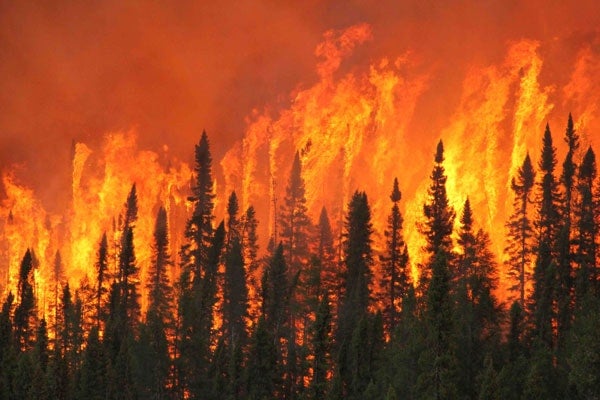
Wildfires: U of T expert explains why they're raging in Western Canada and the impact on cities
Published: July 13, 2015
Wildfires are burning throughout Western Canada this summer, causing the evacuation of communities, the straining of firefighting resources and even the death of one firefighter.
Even large cities such as Vancouver, Edmonton and Saskatoon have been affected – and the story is making headlines around the world. (Read the Guardian's article.)
U of T News writer Brianna Goldberg talked to Forestry professor David Martell to find out why wildfires seem so much worse this year.
Are the wildfires out west worse this year or does it just seem that way?
They are worse than usual because they are suffering drought and experiencing “good” burning conditions, generally some combination of little rain, high temperatures, low relative humidity and high winds. Large-scale weather patterns like those they are experiencing out west (and the cooler, wetter conditions we are experiencing in the east) are influenced by sea surface temperatures and their impact on upper level wind flows.
Wildfires seem to be affecting cities more than in the past. Why are wildfires becoming an increasingly urban problem?
That wildfires seem to be affecting communities more than in the past is perhaps in part a result of both more fire and more media coverage. Small northern communities have long endured fire threats but I do not believe those threats were as well covered by the media in the past as they are today.
Most Canadian forest fire management agencies were created in the early decades of the 20th century in response to fires that swept through entire communities and killed hundreds of people. Fortunately we have not experienced such losses in recent years but the Kelowna and Barriere fires that occurred in British Columbia in 2003, the Slave Lake fire in Alberta in 2011 and the losses that have been incurred in western Canada this summer are stark reminders of what can happen.
Increased threats to communities are also in part, a result of the fact that more and more homes are being built in flammable forest complexes on the edge of and near existing communities and increasing what fire managers refer to as the wildland urban interface (WUI). We need to devote more effort to “fire smarting” communities in the WUI to mitigate the damage incurred when fires approach them.
The problem in large cities like Vancouver is smoke and the fact that it can be carried long distances.
How can or should cities specifically cope with the fallout from forest fires?
Fire produces smoke that degrades air quality and fires can, and sometimes do burn into communities where they threaten public safety and burn homes and other structures. Questions about how to deal with smoke problems can best be answered by public health specialists and although Vancouver, Edmonton, Saskatoon and many other smaller cities have been “smoked in” this summer, changes in wind direction usually dissipate smoke problems in those large cities relatively quickly.
Unfortunately, small northern communities are near so many large fires that when the wind shifts direction it simply replaces smoke from one fire with smoke from other fires that are upwind of the community with respect to the new wind direction. Those small northern communities therefore tend to be much more severely affected by longer smoke events that contribute to a need for evacuation.
What will you be watching for in the next weeks and months?
The long-term weather forecasts suggest that it will remain hot and dry out west and relatively cooler and wetter in the east. If that does indeed prove to be the case, fires will continue to pose threats to public safety, property and forest resources out west and the eastern provinces will continue to loan some of their fire management resources to the western provinces and territories. What I will be watching out for and most concerned about is the communities that will be threatened, the residents who will suffer from being evacuated and in some cases, lose their homes and the safety of the fire fighters and others engaged in fire operations.
Some large fires may well burn until the snow flies, but not as raging crown fires that threaten communities. Fire management agencies will gradually bring most if not all of the fires under control so they will no longer be actively spreading and threatening communities.
What do most people not know about forest fires that you think they should?
That fire is a natural component of many forest ecosystems and for a variety of reasons we are going to have to adapt to putting and leaving more fire on our landscapes in the future. We are now moving away from attempting to exclude fire from our forests and developing methods of managing that fire to achieve an appropriate balance between the social and economic costs and the ecological benefits of fire.
(Image below: Professor Martell on the site of a British Columbia fire in 2010.)

On a personal note, what interests you about forest fires?
I grew up in the north and fire was always there in the background but I did not become seriously interested in fire until the summer of 1970. I was an undergraduate industrial engineering student at U of T and I was fortunate enough to secure a summer job with the then Ontario Department of Lands and Forests, assisting with the development of mathematical models of water bomber operations. I enjoyed developing models of fire management systems and subsequently focussed my MASc and PhD research in industrial engineering on fire management problems. As I neared the end of my PhD program I applied for, was offered and accepted a tenure-stream appointment in the Faculty of Forestry here at the University of Toronto. I then began collaborating with the Ontario Ministry of Natural Resources which proved to be a rich source of interesting and challenging research topics.
My research is focused on furthering our understanding of fire management processes and using operations research and management science methods to develop decision support systems that fire mangers can use to help improve their decision-making. When asked to explain what I do in non-technical terms I used to say my research was focussed on helping Smokey Bear do his job cheaper and better but now I usually say I study logistics and analytics and how to apply them to forest fire management problems.



